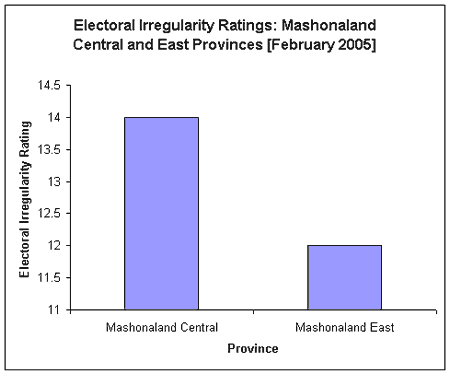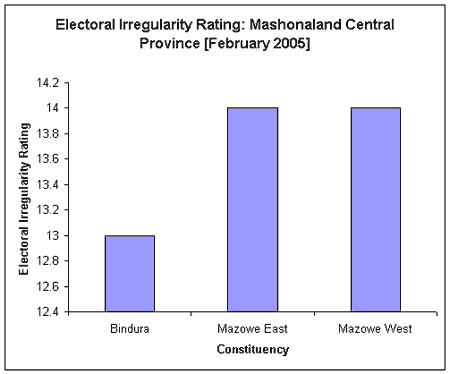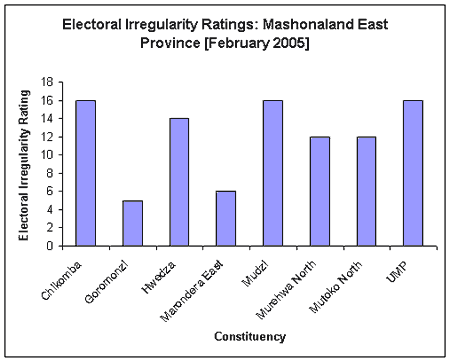| |
Back to Index
Election
Climate Report No. 03
National
Constitutional Assembly (NCA)
February
25, 2005
Download
this document
- Word
97 version (227KB)
The Election
Climate Reports are produced by the NCA in order to provide information
on the prevailing climate for citizen participation in the forthcoming
Parliamentary Election. The NCA has already communicated its condemnation
of the constitutional framework under which the elections are being
conducted. The Report is a consolidated statement of the reports
sent in by a national network of community monitors.
The community
reports sample a number of electoral "atmospherics" (described
below), which aim to provide a clear description of the state of
affairs prevailing in any one constituency:
- Freedom of
Association;
- Freedom of
Assembly;
- Freedom of
Movement;
- Freedom of
Expression;
- Incidence
of Political Violence;
- Disputes
over electoral procedures and electoral irregularities;
- Occurrence
of voter education;
- Use of food
as a political weapon.
The reports
sample 18 critical indicators and hence provide a simple score for
any one constituency, which we have termed the "Electoral Irregularity"
[EI] score: the higher the EI score, the worse the electoral climate
in a constituency.
Overview
The
election climate in Mashonaland Central and East
is not currently conducive to free elections as the EI
ratings are high in both Provinces. Mashonaland Central had
an average EI of 14, whilst Mashonaland East had an average
EI of 12.
There was little
variation in the EI ratings for those constituencies sampled
in Mashonaland Central: Bindura [13], Mazowe East [14], and Mazowe
West [14] all had high EI ratings. There was rather more
variation in the EI ratings in Mashonaland East. Goromonzi
[5] and Marondera East [6] had relativelt low EI ratings,
but Chikomba [16], Mudzi [16], and UMP [16] had very high EI
ratings indeed.
Both Provinces
are well known for being politically charged, and political violence
was widely reported in both Provinces during the 2000 General elections
and the Presidential Election in 2002. Political violence has again
been reported in almost all the constituencies, mostly in the form
of hate speech, threats, and intimidation rather than physical violence.
There were a
few constituencies that did not have interferences with freedom
of assembly (Marondera East), or electoral disagreements (Goromonzi,
Murehwa North, Mutoko North). The reports indicated that, in Chikomba,
Hwedza, Marondera East, Mudzi, UMP and Murehwa North, there was
no formal voter education. ) The political use of food was reported
in 8 of the 11 constituencies samples, with this not being reported
in only Marondera East, Mudzi and Murehwa North.
The NCA calls
upon all concerned parties – government, the political parties,
and the civics concerned with peace building – to take immediate
steps to investigate these allegations, and to take firm steps to
correct all irregularities confirmed.

Mashonaland
Central
There was relative uniformity in the reports from the three constituencies
sampled. As is seen from the figure below and the table in the appendix,
the EI ratings were high in all three constituencies: Bindura [13],
Mazowe East [14], and Mazowe West [14] were all high.
Interferences
with the basic freedoms were reported in all 3 constituencies: they
all reported interference with the freedoms of association, assembly,
expression, and movement. All three constituencies reported political
violence, mostly as hate speech, intimidation, and threats, and
none of the 3 constituencies reported any form of formal voter education
taking place. All three reported the political use of food.
As the reports
indicated, the opposition and other groups were unable to wear their
insignia and put up their posters. There were no reports of ZanuPF
being prevented from doing any of the above. There were interferences
with freedom of assembly as ZanuPF supporters forced residents to
attend political meetings: ZanuPF held more meetings than the MDC,
with an average of 4 meetings, whilst the MDC only managed to hold
2 meetings in Mazowe East.
With regard
to interferences with freedom of movement, it was reported that
the police, youth militia, Zanu supporters, and the CIO are involved
in preventing people from moving in the constituency freely. In
Mazowe East, the police department involved in these activities
was alleged to be PISI. In Bindura, ZanuPF youth were said to be
the main group stopping citizens, and asking about people's
movements.
The same groups
were mentioned as interfering with people moving out of the constituencies,
with the addition of the army in Mazowe East. PISI was said to be
heavily involved in the control of movements out of the communities.
There are reports of new people being moved into the constituencies
and most of them are voters and or militia. It was reported that,
in Mazowe East, the militia were still registering people to vote
way beyond the deadline. In Bindura, it was alleged that 3 lorry-loads
of strangers came to register even though the last official date
had lapsed.
It was reported
that members of the opposition and civic organisations are unable
to express themselves freely, and are not even able to read newspapers
of their choice. There is a huge fear of being harassed and this
prevents most people from saying or reading what they would really
want to. In Mazowe West, it is reported that Moslems are being harassed
for being MDC members, and they therefore are not free to exercise
their freedom of expression. It is alleged that people are forced
to chant Zanu slogans, which they do as they fear the consequences
of refusing to do so.

There is a
presence of politically motivated violence with Zanu PF, youth militia,
police, and CIO being the main perpetrators, and MDC mostly being
the victims. In Mazowe West, Constable Mbizi was named as one of
the perpetrators. Incidents of gender based political violence were
reported but, unlike Harare Province, there were no reports of rape.
However, there were some reports of indecent assault in Mazowe West
and East. The other gender related violence was forced attendance
at a party base, which occurred in Mazowe East and Bindura: these
bases were allegedly Zanu PF.
There were reports
of hate speech and intimidation, mostly by ZanuPF supporters against
the MDC; this reportedly occurred in Mazowe West, Mazowe East, and
in Ward 9 of Bindura Constituency. In Ward 6 of Bindura constituency,
it was reported that both parties were involved. There was little
intra or inter party violence, with intra party only reported in
Bindura and Mazowe East. This was alleged to be within ZanuPF, whilst
the inter party violence was reportedly perpetrated by ZanuPF against
the MDC. Militia bases were said to exist only in Mazowe East.
There were reports
of election disagreements, mainly by MDC with ZanuPF. However, in
Bindura, it was reported that ZanuPF had complaints against the
MDC. According to these reports, the relevant authorities -
ZEC and ESC - are not conducting voter education. The ESC were reported
to have only done this in one constituency, in Mazowe East. ZanuPF
were said to be conducting some, but it was alleged that the MDC
was prevented from doing so. The MDC were reported to have done
in only in Mazowe East. All the constituencies reported the use
of food as a campaign tool being used by ZanuPF.
Mashonaland
East
There was greater variation in the EI ratings in Mashonaland East
Province. Chikomba [16], Mudzi [16], and UMP [16] all had very high
EI ratings, whilst Goromonzi [5] and Marondera East [6] had relatively
low EI ratings in comparison.
Interference
with the basic freedoms of association, assembly, expression, and
movement were reported in virtually all the constituencies sampled.
Political violence was reported in all the constituencies, mostly
as hate speech, intimidation and threats, but there were also some
very serious allegations of assaults, sexual assaults, and attempted
murder made. Electoral disagreements were widespread, with this
reported in all the constituencies samples, and formal voter education
took place in only 2 of the 8 constituencies. The political use
of food was reported in 5 of the 8 constituencies, with only Goromonzi,
Marondera East, and Mudzi free from this irregularity.
Freedom of association
was interfered with in most of the constituencies, with MDC members
being unable to put up posters and wear their insignia: only in
Chikomba was ZanuPF unable to wear their party insignia. There were
other parties as well that were unable to exercise their freedom
of associations but these were not named.
It was reported
that, in all constituencies, ZanuPF was able to hold more meetings
than the MDC. However, in Mudzi, ZanuPF not hold a meeting, whilst
the MDC were able to hold 3. On average, ZanuPF was able to hold
3 meetings to every 1 of the MDC. All the forced attendance at meetings
were alleged to have been done by ZanuPF; only Marondera East and
Goromonzi had no forced meetings. The monitors attended mostly Zanu
meetings probably because these were the forced ones.
In terms of
freedom of movement, the police, the youth militia, CIO, the army,
and ZanuPF supporters were allegedly responsible for these infringements,
which were mainly against the MDC. It was reported that there is
interference with freedom of movement outside the constituencies,
and the youth are largely responsible for this. In Hwedza and Goromonzi,
people were free to move as they wished. It was alleged that new
residents seen in the constituencies were either introduced by the
militia, or that these new residents are the militia themselves.
In Murehwa, it was alleged that soldiers in civilian clothing are
being introduced to the areas. However, these were minor occurrences,
and, overall, there seemed to be little occurrence of new residents
being introduced in Mashonaland East.

As indicated
earlier, it was reported that freedom of expression is being interfered
with in Mashonaland East Province: most people in Mashonaland East
are fearful of expressing their views openly. It was alleged that
members of opposition political parties are the ones most affected
by this. Against this general trend, there were reports from Mutoko
North, Murehwa North, UMP, and Chikomba where Zanu PF supporters
are unable to read the newspapers of their choice. It was reported
that ZanuPF was generally the party responsible for forcing people
to chant slogans, but MDC was also said to be forcing people to
chant slogans in Murehwa North and Mudzi.
As regards political
violence, death threats, assault, sexual assault, attempted murder,
displacement, and unlawful arrests were reported. The perpetrators
were allegedly ZanuPF youth, militia, CIO, police, and the army,
whilst the victims were alleged to be members of the MDC. There
were a few reports of gender based political violence, mainly of
women being forced to go to party bases: in all reported cases,
the perpetrators were Zanu and the victims were MDC. There was one
report of indecent assault in Chikomba, allegedly as a result of
refusing to attend a ZanuPF meeting, whilst one case of rape was
alleged to have taken place in Mudzi.
There were numerous
reports of hate speech and intimidation, mainly by ZanuPF against
the MDC and others, but there are also reports of similar behaviour
by the MDC against others. It was reported that there had been inter-party
violence, mostly by ZanuPF against the MDC, but, in Chikomba, it
was alleged that the violence had been perpetrated by the MDC against
ZanuPF. As regards intra-party violence, there was one report of
MDC skirmishes in Chikomba, but most other reports were about conflicts
within ZanuPF. The presence of militia bases was alleged in a number
of the constituencies, specifically at Unyetu Primary School in
Chikomba, and near Nyadire in UMP.
There were electoral
disagreements between the two main parties reported in all of the
constituencies in Mashonaland East Province. These disagreements
were equally divided between ZanuPF raising disagreements with the
MDC, and vice versa.
Voter education
was low in the Province. It was reported that ZESN had conducted
voter education in Hwedza and Mudzi; ZanuPF had done so in Chikomba
and Marondera East; and the ESC had done so in UMP. This was the
only constituency where voter education was reported to have been
carried out by the ESC.
Political use
of food was reported in Mudzi, Mutoko North, Hwedza, Murehwa North,
and UMP. Here it was alleged that, in order to get food, one needed
a Zanu PF card. In Chikomba, the MDC was also said to be using food
as a political tool.
Recommendations
The present environment in Mashonaland is not currently conducive
to free and fair elections. As the reports indicate, both parties
are alleged to be responsible for the environment being the way
it is, but it also evident that, on balance, ZanuPF is reported
to be the more serious producer of electoral irregularities, and
well as more frequently implicated in the allegations of the more
serious irregularities, such as political violence and the political
use of food. The point that there is so little voter education being
carried by the ESC this close to elections is worrying, and needs
to be seriously investigated by the political parties, civic groups,
and all observer groups.
There is a pressing
need to build a climate of peace and tolerance, and the NCA calls
upon all organizations concerned with peace building to investigate
these allegations, and to take immediate steps to rectify all problems
identified.
Women's
organisations should take steps to investigate the claims of abuse
to women as a matter of urgency, as there are allegations of the
ill treatment of women which are nor receiving appropriate attention.
Download
and read the full report
Visit the NCA
fact
sheet
Please credit www.kubatana.net if you make use of material from this website.
This work is licensed under a Creative Commons License unless stated otherwise.
TOP
|

